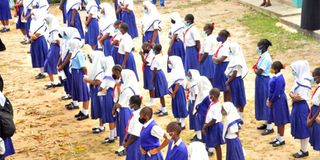Social distancing headache in overcrowded public schools

Pupils at Star of the Sea Primary School in Mombasa after reporting back to school on October 12, 2020.
What you need to know:
- Parents should teach their children and model how to be flexible and using coping strategies.
- Parents need to talk openly about the certainty and uncertainty of the pandemic.
- Learning to live with uncertainty and still be able to enjoy learning, friendship, and relationships is a key growth skill.
As Covid-19 confinement measures around the world gradually lifted and students return to school, countries must be ready to focus on the health and well-being of school communities.
In Kenya, over 17 million students had their learning interrupted when schools closed in March due to Covid-19 pandemic. In October, the government reopened schools in phases after a seven-month break in adherence to the statutory Covid-19 safety measures.
Schools are set to reopen on January 4 and, to meet government guidelines to prevent the spread, parents are expected to dig deeper into their pockets. The new requirements include mandatory wearing of face masks, monitoring of students’ and teachers’ temperatures, having hand-washing points and general observance and maintenance of high levels of hygiene.
The closure of schools has revealed multiple health risks, with the most vulnerable children bearing the greatest impact. Many children missed out on school meals, while others experienced or were exposed to violence. There have also been sexual and reproductive health risks and impacts on mental health and well-being brought about by stressful home life, poverty, isolation and uncertainty of online learning.
According to Carmen Burbano, the director of school-based programmes at the World Food Program, the cost of keeping schools closed is greater than the risks we are seeing. We, therefore, need safe and creative ways to keep schools open. Prolonged school closures are likely to cause students to regress academically, especially as online learning has not been effective and accessible to all.
Strong and smart
Back to school preparations should, therefore, focus on key areas such as psychological, physical, financial and emotional wellbeing to reduce anxiety for both parents and children. Anxiety not only stems from the fact that some parents do not have money to take their children back to school but also due to the new environment that they are faced with.
We need to help children to understand that while there might be a plan for going back to school, we should be flexible and ready to adjust. Parents should teach their children and model how to be flexible and using coping strategies. Parents need to talk openly about the certainty and uncertainty of the pandemic. Learning to live with uncertainty and still be able to enjoy learning, friendship, and relationships is a key growth skill.
Parents can help children to focus on the things they can control, such as how to wear face masks correctly and proper hand-washing, as well as social distancing rather than the things they do not know or cannot control.
Let parents help children practice these skills before learning resumes and talk about how it will work in school especially for those in boarding. For instance, while they cannot run up and hug their friends, they can use a different fun greeting like dance.
Younger children who struggle with wearing masks can be made to feel more comfortable with the idea by turning it into a fun game. One idea is to tell them, “Your mask makes you strong and smart, so keep it on all the time. And if you or your friends touch your face or you touch someone else, that reduces your power and smartness.”
Parents should also talk to their children about what to do if they do not feel safe or when other children do not follow the rules. Children should know that they can talk to the teacher or report to their parents.
Students will be going back to a totally new environment when schools re-open and, mandatory social distancing will be a daunting task, especially in crowded public schools. All schools will also be required to have posters of Covid-19 preventive measures in classrooms for learners and staff to see and be reminded of what they should do.
- Mr Ngugi is the Country Director, ChildFund Kenya.





